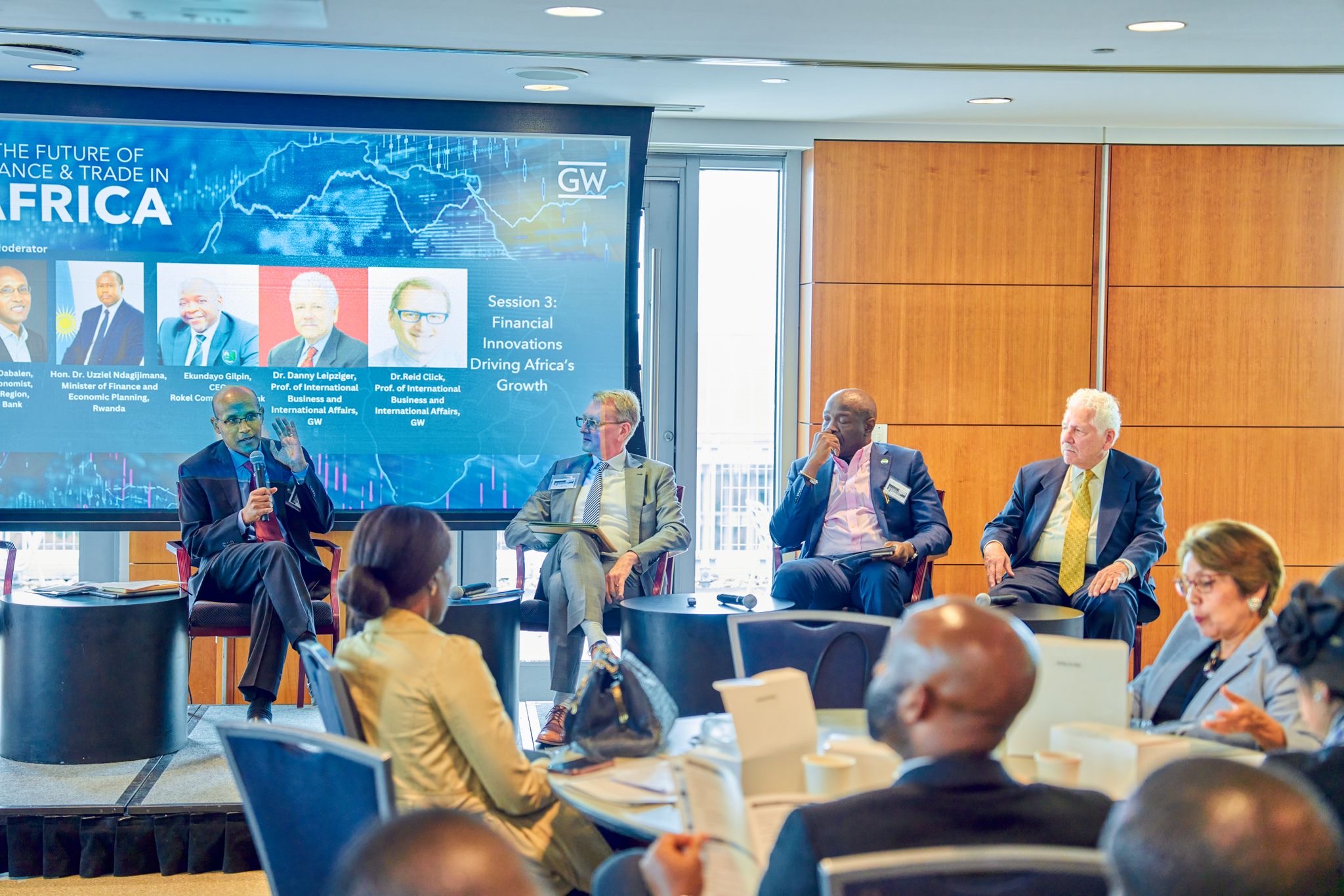The role that African banks can play in driving emerging financial technologies dominated discussion at a high-level conference that brought an estimated 150 corporate executives, economists, U.S. Congress members, digital technology leaders, academics and global development experts to George Washington University.
Participants at “The Future of Finance & Trade in Africa: Harnessing Emerging Technologies and Financial Innovation for Inclusive Growth” examined challenges facing the continent, as well as policies and initiatives that could underpin sustainable growth. The April event was organized by the GW School of Business, The Growth Dialogue, the GW Institute for International Economic Policy at the Elliott School of International Affairs and diaspora organization Believe in Africa.
“The conference served as a platform for GW to actively contribute to global economic prosperity by addressing critical issues, such as climate challenges, through financial innovation and promoting the role of technology in economic growth and financial inclusion,” said Kafuti Talahumbu, GW’s associate director of corporate partnerships and an organizer of the event.
“With a focus on engaging the GW community and advocating for increased involvement in future events, the conference emphasized Africa's pivotal role in shaping the world's future economy, aligning with projections that indicate the continent’s significant demographic influence by 2050,” he added.
Professor of Practice of International Business Danny Leipziger, who directs The Growth Dialogue, a GW Business think tank that focuses on sustainable global development, said the gathering “showcased that the School of Business has an intense interest in Sub-Saharan Africa, particularly as the region holds so much promise for innovation and technology development if private initiative can be paired with smart economic policies and effective investments in human capital.”
The topic of financial innovation sparked the liveliest discussion at the conference, underscored by optimism about African fintech’s potential to transform economies and extend access to credit beyond the reach of traditional banks.
The search for new drivers of sustainable and equitable economic growth was also at the core of many of the sessions throughout the day. During a fireside conversation moderated by Leipziger, Rwanda’s Central Bank Governor, John Rwangombwa, noted that financial services are positioned to drive tremendous growth, but access to financial services needs to be “equitable, fair and affordable.”
Speakers also gave their perspectives on the Africa Growth and Opportunity Act (AGOA), which regulates the entry of goods, tariff free, into the United States. The act is up for renewal in 2025. Numerous experts see large potential gains through its extension.
“Up until now, the trade has been primarily in commodities, but the challenge is to move beyond minerals and commodities and into more processed goods and services, including financial services,” said Leipziger. He noted that digital technologies have the potential to eliminate many of the geographic obstacles to trade.
In a panel session that examined climate finance, Diep Nguyen-van Houtte, senior manager for climate business at the IFC, the private sector arm of the World Bank Group, highlighted that her organization has made investment in climate a priority. Artificial intelligence (AI) and the role that African entrepreneurs can play in fostering growth in Africa were also explored during the event.
Ian Campbell, who sits on the Maryland Commission on Africa, said work is underway to build business-to-business and state-to-state links that would open avenues for African businesses interested in investing in the United States and U.S. businesses seeking relationships in Africa.
Following the conference, Talahumbu said, there was corridor talk about the creation of an African Technology Business Center at GW. Additionally, partnerships for joint research projects were put in motion with corporate entities. Talahumbu said ongoing discussions between the School of Business and private sector leaders promised “enriching contributions to the GW community.”
The conference is envisioned as a recurring event, perhaps annually or biannually in conjunction with the annual meetings of the World Bank and the IMF. Participants were impressed with the experts who shared their insights and enthusiastic about the networking opportunities afforded to entrepreneurs who are active in Africa.


